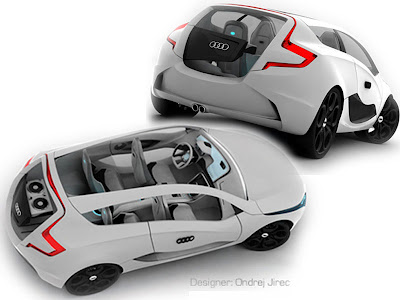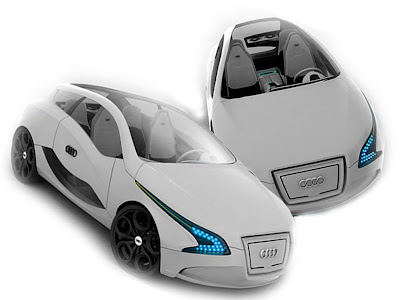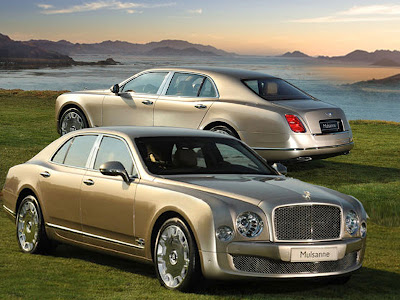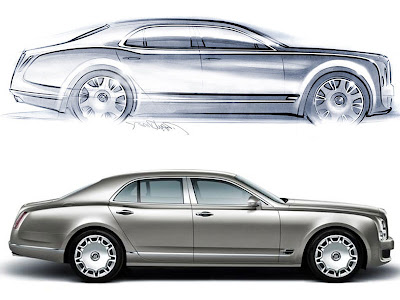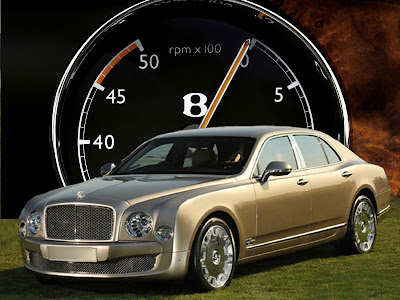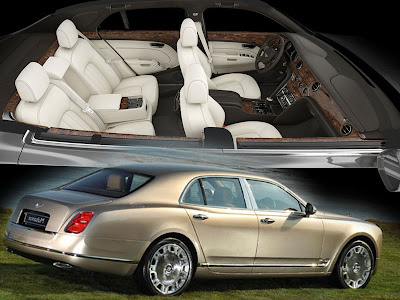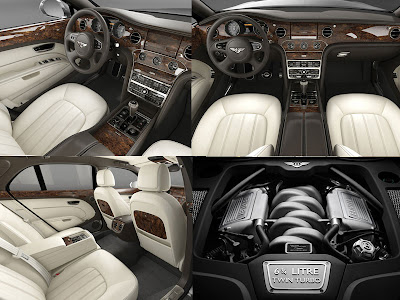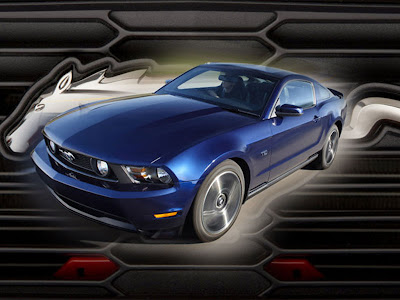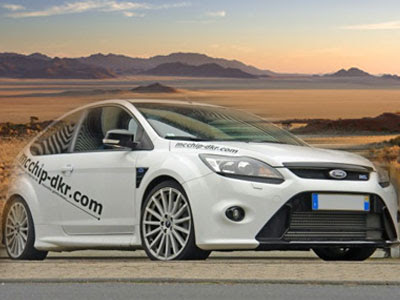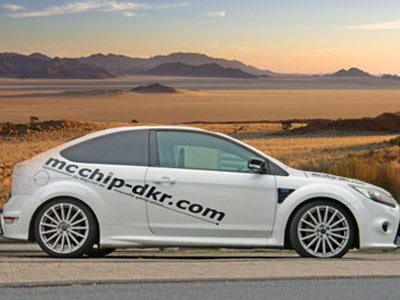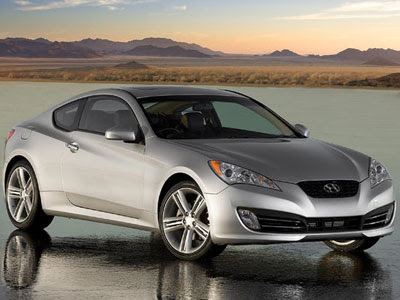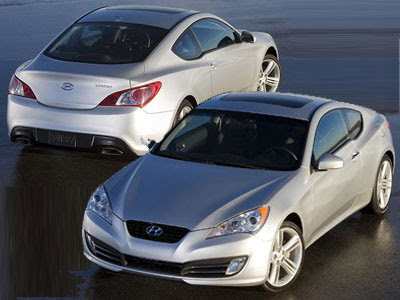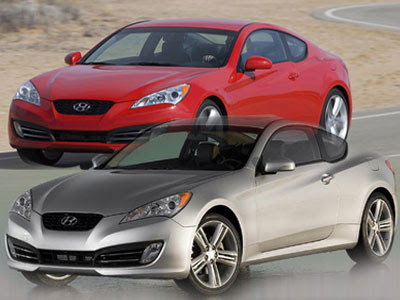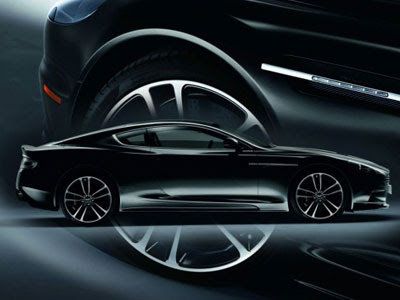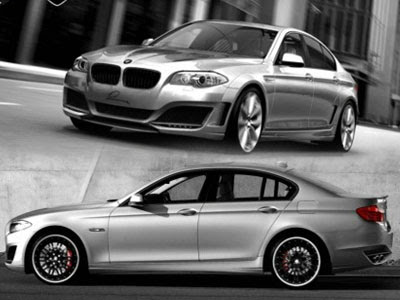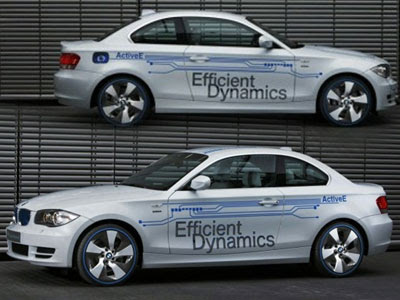|
|
|
|---|
Thursday, December 31, 2009
Audi O Sports Car Concept is fuel efficient diesel/electric hybrid drivetrain
0 comments Posted by anna maria at 10:09 PMAudi O Sports Car Concept
The Audi O concept was designed to fuse a powerful and innovative audio system with a stylish and sporty four-seat hatchback. The exterior design uses several Audi trademark styling themes, especially at the front where the square grille sits neatly between the LED headlights.

Audi O Sports Car Concept
The doors feature glass windows running along the bottom edge which provide an interesting shape to the profile of the car. At the rear of the car the pullout door echoes the design of the squared off Audi grille. The 2008 Audi O concept was designed by Ondrej Jirec, a design student from the Czech Republic who is beginning studies at the Art Center College of Design, Pasadena, California in 2008.
The interior of the Audi O concept is bright and airy thanks to a full length panoramic roof which floods the cabin with light. Inside, the passenger compartment has been separated from the engine compartment by a double firewall to help keep out external noise which might interfere with the powerful sound system.
The Audi O concept features a unique audio system which has internet connectivity for downloading music onto the built-in 650 GB hard drive. When parked up a Bluetooth system can connect two or more Audi O cars to play audio over a wider area. In this situation, a host Audi O is set to be the source of sound and the other vehicles act as speakers.
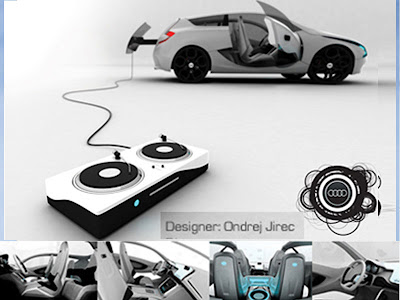 Audi O Sports Car Concept
Audi O Sports Car Concept The Audi O also features a pullout rear door fitted with a DJ set with mixing decks. The decks can also be removed and used anywhere outside the car.
Powering the Audi O concept is fuel efficient diesel/electric hybrid drivetrain.
Labels: Audi, Concept Car, Sports Car
2010 New Bentley Mulsanne Luxurious Sports Car The 8-litre’s Debut at Pebble Beach Concours D’Elegance, California
0 comments Posted by anna maria at 10:38 AM2010 Bentley Motors unveiled the Mulsanne, the company’s all-new flagship grand tourer, at the prestigious Pebble Beach Concours D’Elegance in Monterey, California. The Mulsanne is inspired by the company founder W.O. Bentley’s crowning achievement in 1930, the 8-litre. And it was W.O.’s own sensitively conserved company car that shared the podium with the new Mulsanne in Pebble Beach. This early motoring masterpiece represented the last big Bentley that was designed, engineered and built from the ground up by Bentley engineers - until now.
Nearly 80 years later, while paying respect to this illustrious past, the new Mulsanne is a thoroughly modern statement of luxury driving and grand touring. Conceived, styled and engineered entirely at Bentley’s headquarters in Crewe, England, the Mulsanne, with its completely new and unique platform, goes into production next year in a new state-of-the-art manufacturing facility within the Crewe factory. The Bentley design team, lead by Dirk van Braeckel, have created a flagship that offers the classic sporting, styling cues long-associated with Bentley - expressed in a thoroughly contemporary way.
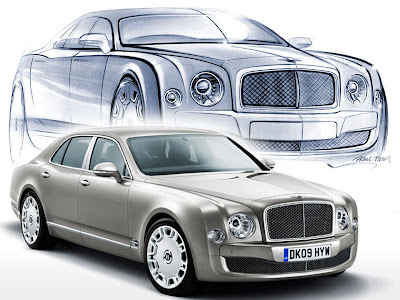 2010 New Bentley Mulsanne Luxurious Sports Car
2010 New Bentley Mulsanne Luxurious Sports CarThe return of the Mulsanne name to a car carrying Bentley’s iconic ‘Winged B’ emblem underlines the company’s racing pedigree and nowhere reflects that heritage better than the famed Le Mans circuit, the scene of no fewer than six Bentley triumphs. Few places offer a stronger or more emotive connection with the Bentley marque than the famed Mulsanne corner.
The Bentley 8-litre displayed alongside the Mulsanne in California was first shown at the 1930 London Motor Show.
It was the second-built and was W.O. Bentley’s company car for two years. Capable of reaching more than 100 mph, the 8-litre demonstrated W.O. Bentley’s ambition and ability to build a grand luxury car capable of surpassing every other leading manufacturer of the day. A total of 100 cars were built in 1930 and 1931.
“The 8-litre’s breathtaking performance and quality was perhaps the finest example of a ‘pure’ grand Bentley. Every mechanical detail carried W.O. Bentley’s unique stamp and it was the clearest demonstration of a car built without compromise,” commented Dr. Ulrich Eichhorn, Member of the Board Engineering. “The Mulsanne has been designed with exactly the same guiding principles, so it is entirely fitting that these Bentleys from different eras share the same stage.”
The Bentley Mulsanne will go on sale from mid 2010. It will also be displayed at the forthcoming IAA Frankfurt Motor Show (15-27th September, 2009) where Bentley Motors will provide additional product information.
Labels: 2010, Bentley, Luxurious Sports Car, Sports Car
Wednesday, December 30, 2009
2010 Muscle goes modern for the Ford Mustang - America's favorite muscle car for 45 years straight - hits the streets with a new exterior design; new world-class interior featuring well-crafted materials and updated technology; and a V8 with even more horsepower and an even throatier signature Ford Mustang exhaust sound.
Combine those elements with the new Mustang's improved handling characteristics, more standard safety and technology features and its already-strong safety and quality performance and reputation, and it's easy to see how the muscle car known around the world delivers on the promise of fast, fun and affordable performance for a whole new era.
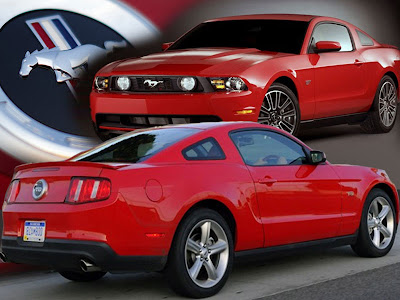 2010 Ford Mustang Sports Car 4.6-liter V8 Engine
2010 Ford Mustang Sports Car 4.6-liter V8 Engine
"The best Mustangs have always been the ones that connect young America with the spirit of the times - and the 2010 does exactly that," said J Mays, Ford's group vice president of Design. "The new Ford Mustang is close to the magnetic center of the original, fully loaded with the swagger you'd expect, but with modern refinement and attention to detail like you've never seen in a muscle car."
It starts with the more aggressive grille, punctuated with the first new Mustang emblem since the car's introduction in 1964. Both the V6 and GT have brand-new sculptured front-end designs unique to each model. The headlamps and turn indicators, now integrated into one unit, are modern interpretations inspired by the 1970 Ford Mustang. On the V6, the fog lamps are located on the lower fascia, while on the GT, the fog lamps are again located in the upper grille - but are smaller than the outgoing model, similar to the original lamps of the 1967-68 models that inspired them.
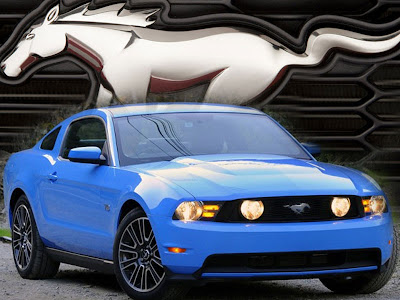 2010 Ford Mustang Sports Car 4.6-liter V8 Engine
2010 Ford Mustang Sports Car 4.6-liter V8 Engine
Cleverly combining modern technology with Ford Mustang heritage is a signature of the 2010 model, in terms of both design and engineering. The wheel-and-tire combinations are 1 inch bigger across the board, ranging from 17 to 19 inches, which helps improve handling and braking. The shocks have been retuned on all models as well. The 2010 Ford Mustang 4.6-liter V8 benefits from innovations from the popular Ford Mustang Bullitt model. Power has increased to 315 horsepower. "It runs on regular gasoline, but if you put in premium it has adaptive calibration that will give you even better mid-range torque," Barnes said, adding that Easy Fuel™, Ford's innovative capless fuel system, is standard on all models. "It's an upgrade to the most-robust, most-accessorized engine in the marketplace today," Randle added. "No one has the reliability, no one has the upgraded options. This is a fantastic engine, proven on the race track, the drag strip and on the highway."
AdvanceTrac™ Electronic Stability Control (ESC) is now standard and complements Mustang's all-speed traction control and anti-lock braking system (ABS). In addition to all of the design and driving dynamics improvements, the 2010 Ford Mustang is engineered to maintain its top government safety ratings. Standard safety equipment includes: dual stage front driver and passenger air bags; front seat-mounted side air bags; and, Ford's Personal Safety System.
The powerful new one-piece instrument panel design is crafted in seamless soft-touch TPO (Thermoplastic Olefin) skin fully encompassing available genuine aluminum-finish panels. Mustang's chromed-ringed gauges and dual-vane air register vents are precisely crafted and positioned.
With a completely redone exterior that echoes the classic Mustang designs of the past, an interior featuring world-class materials, numerous technology upgrades and an improved driving experience, the 2010 Ford Mustang is poised to become the latest classic in the proud line of Ford's iconic American muscle car.
From the V6 to the Shelby GT500, the goal was to make each model appear even more sculpted than its predecessor. The result is a lineup of iconic cars that maintain their identity in a contemporary way. Each classic design element - the grille shape, the "hockey stick,' the hop up into the rear haunch, the quarter-glass window, the three-bar tail lamp, the center-mounted gas cap - is modernized in a way that lends the new car even more presence and character. The aggressive look is enhanced by larger grille openings flanked by slimmer headlamps, which now incorporate integrated turn indicators.
The team further enhanced the agile design by stripping away unnecessary clutter. That included minimizing overhangs, eliminating the rear key-hole cylinder, chamfering the rear corner and simplifying the pedestal spoilers to a more compact design. The antenna, previously on the front fender, is now much shorter and relocated to the rear of the 2010 Ford Mustang. The result is a clean, sporty design that looks smart and efficient.
Another inherited and distinctly identifiable Ford Mustang cue comes in the form of the tri-bar tail lamps. The three individual red chambers, each lit sequentially by a single Luxion LED, are separated by two clear vertical back-up elements, ensuring the tri-bar look is recognized in lit or unlit conditions. The sequential illumination of each chamber is a unique and important characteristic of the 2010 Mustang's identity.
Extensive improvements to the next-generation Ford Mustang, readily apparent on the exterior design and interior content and material upgrades, will be felt in the ride and handling of the 2010 model. Taking a cue from the successful Mustang Bullitt and Ford Racing vehicles, many of those enhancements are carried through the full Ford Mustang lineup.
Tires are increased by an inch across the Ford Mustang line, with 17-inch tires standard on the V6 and 18-inch tires standard on the V8. A 19-inch Pirelli Summer tire is late available as an option for those seeking higher performance. Design and engineering teams spent a lot of time honing the aerodynamics of the 2010 Ford Mustang, ensuring that both the aerodynamic drag and lift balance were improved for better overall efficiency.
In true Ford Mustang tradition, there is a "steed for every need." At launch, customers can choose from a V6 or V8 with their choice of coupe, convertible or innovative glass roof, plus several new options and features delivering the opportunity for customers to personalize their cleaner, meaner-looking Mustangs.
 2010 Ford Mustang Sports Car 4.6-liter V8 Engine
2010 Ford Mustang Sports Car 4.6-liter V8 Engine"The best Mustangs have always been the ones that connect young America with the spirit of the times - and the 2010 does exactly that," said J Mays, Ford's group vice president of Design. "The new Ford Mustang is close to the magnetic center of the original, fully loaded with the swagger you'd expect, but with modern refinement and attention to detail like you've never seen in a muscle car."
It starts with the more aggressive grille, punctuated with the first new Mustang emblem since the car's introduction in 1964. Both the V6 and GT have brand-new sculptured front-end designs unique to each model. The headlamps and turn indicators, now integrated into one unit, are modern interpretations inspired by the 1970 Ford Mustang. On the V6, the fog lamps are located on the lower fascia, while on the GT, the fog lamps are again located in the upper grille - but are smaller than the outgoing model, similar to the original lamps of the 1967-68 models that inspired them.
The exterior sheet metal, except for the fast-back roofline, is all new for 2010. At the front, the new headlamps, lower fascias, fenders and grille are capped by a powerdome hood that adds to the muscular appearance while functionally allowing for enhanced air cooling of the engine. Mustang's washer-fluid nozzles are tucked into the cowl, while the antenna has been moved to the rear, both of which create a cleaner appearance while also reducing wind noise. The rear end design features aggressively angled rear corners, a sculptured decklid and prominent rear badge. A rear-view camera incorporated into the spoiler is available on some models.
 2010 Ford Mustang Sports Car 4.6-liter V8 Engine
2010 Ford Mustang Sports Car 4.6-liter V8 EngineCleverly combining modern technology with Ford Mustang heritage is a signature of the 2010 model, in terms of both design and engineering. The wheel-and-tire combinations are 1 inch bigger across the board, ranging from 17 to 19 inches, which helps improve handling and braking. The shocks have been retuned on all models as well. The 2010 Ford Mustang 4.6-liter V8 benefits from innovations from the popular Ford Mustang Bullitt model. Power has increased to 315 horsepower. "It runs on regular gasoline, but if you put in premium it has adaptive calibration that will give you even better mid-range torque," Barnes said, adding that Easy Fuel™, Ford's innovative capless fuel system, is standard on all models. "It's an upgrade to the most-robust, most-accessorized engine in the marketplace today," Randle added. "No one has the reliability, no one has the upgraded options. This is a fantastic engine, proven on the race track, the drag strip and on the highway."
AdvanceTrac™ Electronic Stability Control (ESC) is now standard and complements Mustang's all-speed traction control and anti-lock braking system (ABS). In addition to all of the design and driving dynamics improvements, the 2010 Ford Mustang is engineered to maintain its top government safety ratings. Standard safety equipment includes: dual stage front driver and passenger air bags; front seat-mounted side air bags; and, Ford's Personal Safety System.
The powerful new one-piece instrument panel design is crafted in seamless soft-touch TPO (Thermoplastic Olefin) skin fully encompassing available genuine aluminum-finish panels. Mustang's chromed-ringed gauges and dual-vane air register vents are precisely crafted and positioned.
With a completely redone exterior that echoes the classic Mustang designs of the past, an interior featuring world-class materials, numerous technology upgrades and an improved driving experience, the 2010 Ford Mustang is poised to become the latest classic in the proud line of Ford's iconic American muscle car.
From the V6 to the Shelby GT500, the goal was to make each model appear even more sculpted than its predecessor. The result is a lineup of iconic cars that maintain their identity in a contemporary way. Each classic design element - the grille shape, the "hockey stick,' the hop up into the rear haunch, the quarter-glass window, the three-bar tail lamp, the center-mounted gas cap - is modernized in a way that lends the new car even more presence and character. The aggressive look is enhanced by larger grille openings flanked by slimmer headlamps, which now incorporate integrated turn indicators.
The team further enhanced the agile design by stripping away unnecessary clutter. That included minimizing overhangs, eliminating the rear key-hole cylinder, chamfering the rear corner and simplifying the pedestal spoilers to a more compact design. The antenna, previously on the front fender, is now much shorter and relocated to the rear of the 2010 Ford Mustang. The result is a clean, sporty design that looks smart and efficient.
Another inherited and distinctly identifiable Ford Mustang cue comes in the form of the tri-bar tail lamps. The three individual red chambers, each lit sequentially by a single Luxion LED, are separated by two clear vertical back-up elements, ensuring the tri-bar look is recognized in lit or unlit conditions. The sequential illumination of each chamber is a unique and important characteristic of the 2010 Mustang's identity.
Extensive improvements to the next-generation Ford Mustang, readily apparent on the exterior design and interior content and material upgrades, will be felt in the ride and handling of the 2010 model. Taking a cue from the successful Mustang Bullitt and Ford Racing vehicles, many of those enhancements are carried through the full Ford Mustang lineup.
Tires are increased by an inch across the Ford Mustang line, with 17-inch tires standard on the V6 and 18-inch tires standard on the V8. A 19-inch Pirelli Summer tire is late available as an option for those seeking higher performance. Design and engineering teams spent a lot of time honing the aerodynamics of the 2010 Ford Mustang, ensuring that both the aerodynamic drag and lift balance were improved for better overall efficiency.
Labels: 2010, Ford, Ford Mustang, Race Car, Sports Car, V8
Tuesday, December 29, 2009
2009 Veyron Centenary Bugatti Sports Car a Special Editon Dubai Limited to five cars only
0 comments Posted by anna maria at 6:31 PM2009 Bugatti Automobiles S.A.S. finishes its Centenary celebrations with three tailor made cars, especially developed for its discerning clientele in the Middle East: the Veyron “Sang d’Argent”, the Grand Sport “Soleil de Nuit” and the Veyron “Nocturne”, limited to five cars only. Bugatti Automobiles S.A.S. presents the Bugatti Veyron Bleu Centenaire at the 2009 Geneve Motor Show, a special commission honouring the 100th anniversary of the company, thus initiating a range of worldwide activities celebrating the creation of this mythic brand a hundred years ago. In addition Bugatti Veyron Grand Sport is shown for the first time to a wider public in Europe.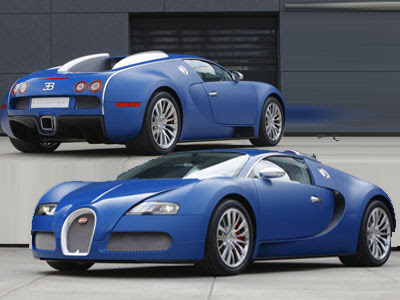

2009 Veyron Centenary Bugatti Sports Car
Honouring the foundation of the company in 1909 Bugatti Automobiles S.A.S opened the anniversary with a one-off version of the Veyron, the “Bleu Centenaire”, at the Geneva Motor Show in March. At the Villa d’Este weekend at the end of April the company paid tribute to Bugatti’s racing history – which was to a great extend responsible for the worldwide reputation of the brand – with four very special Grand Sports, accompanied by their respective Type 35 predecessors, all featuring the traditional racing colours representing France, Italy, England and Germany, namely blue, red, green and white. Bugatti was then one of the honoured marques at the Pebble Beach Concours d’Elegance in California in August and highlighted the event with the presentation of the “Sang Bleu”, a one off Grand Sport in a breathtaking and unique carbon – aluminium combination. The “100th Anniversary Weekend” in Molsheim in September was the platform for a glimpse into the future which might look like the Bugatti 16 C Galibier concept – intended to be the most exclusive, elegant and powerful four door automobile in the world.
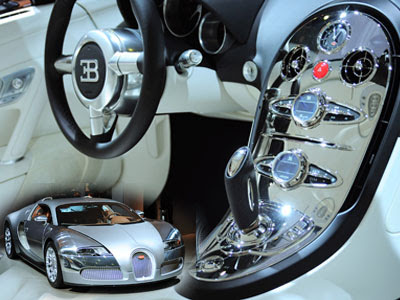 2009 Veyron Centenary Bugatti Sports Car
2009 Veyron Centenary Bugatti Sports CarBuilding on the marque's core values of « Art - Forme - Technique » , Bugatti Automobiles S.A.S. has created the Bugatti Veyron Bleu Centenaire, a unique model to celebrate the hundred year old history of the company. This special model takes up the traditional Bugatti two-tone-specification, but portrays it in one rather than two colours: in the most known light shaded Bugatti blue. The Centenaire's unique combination of a « sprintblue matt » and « sprintblue gloss » hence offers a new impression of the two-tone-scheme known so far with parts of the engine also covered in this traditional Bugatti Blue.
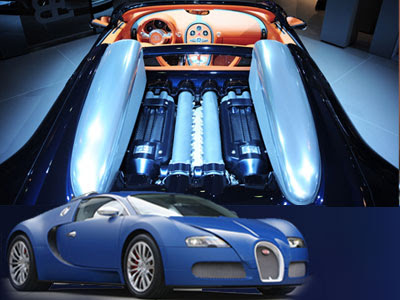 2009 Veyron Centenary Bugatti Sports Car
2009 Veyron Centenary Bugatti Sports Car The roof-trim-stripes and the exterior rearview mirrors are of polished, anodised aluminium. A special wheel design has been added - enhanced by a bright red brake-capillar. The grills at the front and at the side air intakes are in « mirror shine ».
The interior of the Centenaire is fitted in a special «snowbeige» leather with quilting on the seats. The central console is covered in the same leather. New LED lights, Park Distance Control and a rearview camera have become part of the standard equipment for all Bugatti Veyrons from this year onwards.
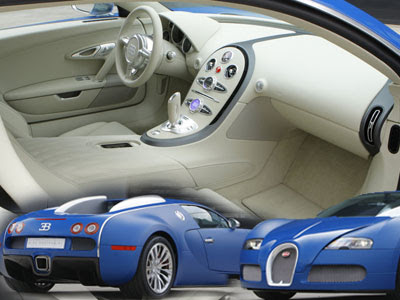 2009 Veyron Centenary Bugatti Sports Car
2009 Veyron Centenary Bugatti Sports Car Labels: 2009, Bugatti, Sport Car, Sport coupe
Monday, December 28, 2009
2010 Ford Focus RS Mcchip-dkr Sports Car offers two power at once
0 comments Posted by anna maria at 4:28 PMQuick as a bird and dressed with sportive elegance – these are the strengths of new Ford Focus RS. But in case of Mcchip-dkr still there is another characteristic to add: it is vigorous like a purebred sports car! The well-known software tuner from Salzgitter/Germany has perfectly attuned the performance to the vehicle. The result is only uncompromising fun from driving but also full suitability for daily use. The engine, completely overhauled by Mcchip-dkr, reaches enormous 401 hp.
Mcchip-dkr Ford Focus RS The most exclusive power upgrade program for the Ford Focus RS is now available. Mcchip-dkr has created this program that raises the output data to the impressive 401 horsepower and 612 Nm of maximum torque. Certainly tuned by Mcchip-dkr Focus RS is an outstanding vehicle in any situation. Mcchip offers two power upratings at once.
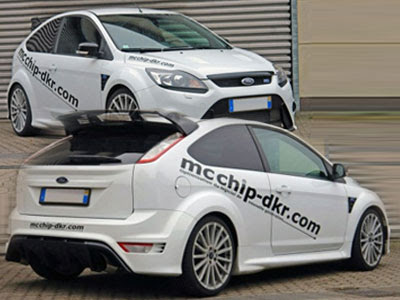
2010 Ford Focus RS Mcchip-dkr Sports Car
Power stage 1 transforms serial 305 hp (440 Nm) into comfortable 345 hp with no less than 520 Nm. Power stage 1 consists „only' in software optimization made by Mcchip-dkr, available for 799 Euro, and your car will easily reach the speed of 271 km/h.
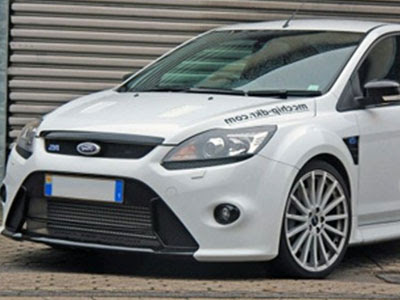 2010 Ford Focus RS Mcchip-dkr Sports Car
2010 Ford Focus RS Mcchip-dkr Sports CarPower stage 2 transforms the Focus RS into an excellent sports vehicle. The Focus RS is given a reengineered intercooler, sports exhaust system, modified inlet manifold and new engine electronics. Power stage 2 gives the car even 401 hp and 612 Nm of maximum torque.
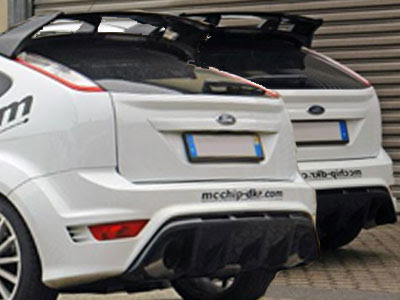 2010 Ford Focus RS Mcchip-dkr Sports Car
2010 Ford Focus RS Mcchip-dkr Sports CarFor a price of 4,499 Euro, the power stage 2 brings the car to achieve a top speed of 278 km/h without any problems. In addition to that the torque equals to 612 Nm. That means powerful pulling and dynamic drive.
Labels: 2010, Ford, Ford Mustang, Sports Car
Sunday, December 27, 2009
2010 Hyundai Genesis Sports Car Coupe with SHIFTRONIC to handle the additional torque
0 comments Posted by anna maria at 9:26 AMThe people at South Korean automaker Hyundai are listening to their customers. The 2010 Hyundai Genesis Coupe, confirmed for production and a release early in 2009, follows the tradition of the 2009 Hyundai Genesis in offering a true high performance rear wheel drive, sporty architecture in an affordable package. The 2010 Genesis Coupe is a purpose-built rear-wheel drive sports coupe featuring two performance-focused engines - a212-horsepower 2.0-liter turbocharged four-cylinder engine and a range-topping all-aluminum 306-horsepower, DOHC 3.8-liter V6 engine.
Genesis Coupe employs a MacPherson strut dual-link front suspension and a five-link rear suspension setup. Both engines are mated to a standard six-speed manual transmission. The Genesis Coupe 2.0t (2.0-liter 4-cylinder turbo) offers an optional five-speed automatic with SHIFTRONIC® while the 3.8-liter V6 offers a ZF six-speed automatic transmission with SHIFTRONIC to handle the additional torque.
The Genesis Coupe follows the styling tradition set forth by the Hyundai Tiburon, but outdoes that aging Hyundai compact sports car in every way. The Genesis Coupe comes with an available naturally aspirated V6, sure to be a motor to find its way into more of Hyundai's lineup. The high output engine offers 310 horses on premium fuel. Following the introduction earlier this year of the rear-wheel drive Genesis sport sedan, Hyundai Genesis Coupe is Hyundai's most dynamic performance car ever and the second consecutive all-new model introduction from Hyundai appealing directly to the car enthusiast.
Hyundai Genesis Coupe uses the same flexible rear-wheel drive architecture originally developed for the Genesis sport sedan.
The 2010 Hyundai Genesis Coupe offers Xenon high-intensity discharge (HID) headlights. The advantages of HID headlamps include greater lighting power, daylight-type lighting and reduced power consumption. In addition, the cut lines of the new HID headlights are extremely precise, providing maximum nighttime visibility without distracting other drivers.
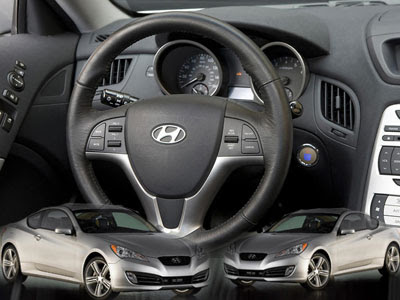 2010 Hyundai Genesis Sports Car Coupe
2010 Hyundai Genesis Sports Car Coupe
 2010 Hyundai Genesis Sports Car Coupe
2010 Hyundai Genesis Sports Car Coupe
The Hyundai Genesis Coupe is offered in three trim levels: the stylish and affordable GS, the premium-sport GT featuring the 3.8-liter V6, and the high-performance SE, available with either the 2.0-liter turbocharged four-cylinder engine or the 3.8-liter V6 engine.
Hyundai Genesis Coupe uses the same flexible rear-wheel drive architecture originally developed for the Genesis sport sedan.
The 2010 Hyundai Genesis Coupe offers Xenon high-intensity discharge (HID) headlights. The advantages of HID headlamps include greater lighting power, daylight-type lighting and reduced power consumption. In addition, the cut lines of the new HID headlights are extremely precise, providing maximum nighttime visibility without distracting other drivers.
All Hyundai Genesis Coupe models feature standard four-channel ABS with Electronic Brake-force Distribution (EBD) to optimize brake performance under various dynamic loading conditions. The system also includes Brake Assist, which provides maximum ABS-level braking force when a panic stop is detected.
 2010 Hyundai Genesis Sports Car Coupe
2010 Hyundai Genesis Sports Car CoupeIt is nice to see that Hyundai, an automaker currently enjoying growth and a solid reputation for producing mainstream-market cars that last, is making steps toward the sports car market. The styling of the Genesis Coupe is hit or miss, some will love it and others will wonder what Hyundai was thinking. But, with the sports car pedigree to back it up, the Genesis Coupe should be another worldwide hit for Hyundai.
 2010 Hyundai Genesis Sports Car Coupe
2010 Hyundai Genesis Sports Car CoupeThe Hyundai Genesis Coupe is offered in three trim levels: the stylish and affordable GS, the premium-sport GT featuring the 3.8-liter V6, and the high-performance SE, available with either the 2.0-liter turbocharged four-cylinder engine or the 3.8-liter V6 engine.
Labels: 2010, Hyundai, Sport Car Coupe, Sports Car, V6
Saturday, December 26, 2009
If Ford first introduced the GT90 Concept at the 2010 Detroit Auto Show next month, it would still be one of the most eyecatching cars on the show floor. What's amazing is that Ford unveiled the GT40 successor nearly 15 years ago. What's more, even by today's standards it's still a supercar among supercars.
The quad-turbocharged 6.0-litre V12 puts out an estimated 720 horsepower, the body is constructed completely of carbon fiber and top speed is somewhere in the 400 kph range. The only hints that it's not a modern supercar are the all-blue interior and wheels that look dated now.
So what's all the fuss about the GT90 Concept now? RM Auctions in the States has just announced that it will be offering the concept car at its upcoming Arizona sale. That's right, this is your chance to own one of the coolest concept vehicles of all time. This is the first time that the GT90 Concept has ever been publicly for sale at auction, and RM claims that it is in "excellent running condition, having been properly stored and maintained over the year." No estimated on price is given, but we're guessing it will take a large suitcase of cash to take the car home.
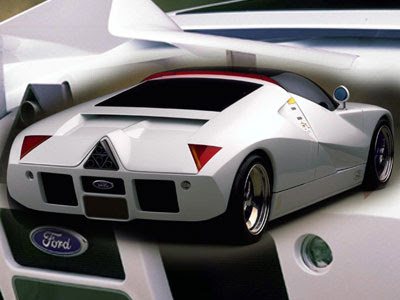 2010 Ford GT90 Super Sport Car Concept
2010 Ford GT90 Super Sport Car ConceptThe one-off GT90 Concept Car, labeled immediately as "the world's mightiest supercar" by Ford Motor Company on December 6, 1994, was the spiritual successor to the Ford GT40, the product of a colossal feud in the early 1960s between the Blue Oval from Dearborn and the Prancing Horse of Northern Italy. The GT90 draws from the design cues of its heritage and pays homage to the famed Le Mans-winning Ford GT40s of the 1960s, which were created after the failed attempt by Ford to buy out Ferrari.
At a development cost in the neighborhood of $3 million, the GT90 was certainly worthy of pulling styling cues from the original Ford GTs, and although it was never meant for production, it was built according to a Ford press release as a "test bed for technology, engineering and design concepts, and driver-oriented features that eventually may be used in Ford production vehicles."
Officially unveiled to the public in January 1995 at the Detroit Auto Show, the GT90 is finished in bright white with a bright blue and carbon fiber interior. It features a mid engine quad-turbocharged V12 that produces an estimated 720 horsepower and 660 pound-feet of torque. As a result, it had a claimed top speed of 253 mph, which even by today's standards would make it one of the fastest production cars in the world – faster even than a McLaren F1, which was widely considered the world's preeminent supercar at the time.
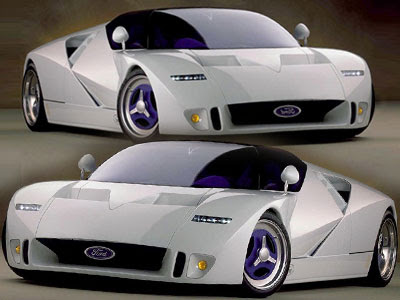 2010 Ford GT90 Super Sport Car Concept
2010 Ford GT90 Super Sport Car ConceptThe engine, which was a 48-valve six-liter V12, had to be combined together with four Garrett Systems T2 turbochargers in order to reach its estimated 720 horsepower and was based on the Ford Modular engine. Created by using parts of two Lincoln V8 engines, engineers removed the last pair of cylinders from the rear of one engine and the first pair of cylinders from the front of the other engine. The cut-down engines were then welded together with the final result being a 90-degree V12, which utilized a 90.2 mm bore and a 77.3 mm stroke to achieve maximum power.
The GT90 features the FFD-Ricardo five-speed manual gearbox found on the XJ220 and, considering the torque load that it is designed to handle, is noted as having a relatively light shift quality. Also borrowed from the XJ220 comes the all around double wishbone suspension that was designed to enable the car to handle well at top speeds.
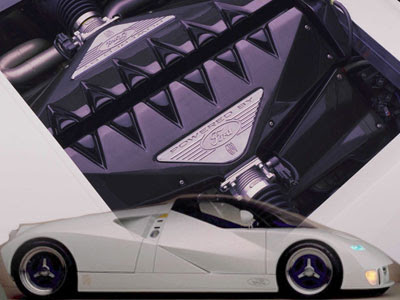 2010 Ford GT90 Super Sport Car Concept
2010 Ford GT90 Super Sport Car ConceptUsing Ford's new "Edge" design philosophy, the car incorporated advanced technology with a mixture of flat planes, angles, glass and triangular shapes that seemingly all collided together. The GT90 was the first car created using this new styling directive from Ford, which went on to be responsible for the creation of other Ford products like the Ka and Cougar. The effect is most impressive and a wonderfully executed stylistic throwback to its GT40 predecessor, which at once stays true to its heritage but acknowledges the advances in modern design. Taken directly from race car technology, the GT90 body panels are molded out of carbon fiber while the chassis is formed out of a honey-comb sectioned aluminum monocoque.
The GT90 is a test bed of advanced technology and design. It sports a tinted, laminated glass bubble over the cockpit and a spoiler that rises off the rear deck at high speeds. According to Ford, it has a "design that tightly enclosed its mechanicals with no wasted space; high tech lighting and blind-spot detection systems; and tiles like those on the space shuttle to shield the V12's exhaust outlets."
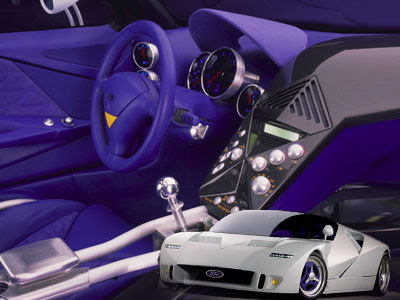 2010 Ford GT90 Super Sport Car Concept
2010 Ford GT90 Super Sport Car ConceptAfter its unveiling in Detroit, the GT90 made its rounds on the Auto Show Circuit in 1995, traveling around the world to Frankfurt and as far away as Tokyo. With few other showings in between, the car recently was shipped over to Europe to be on display in the Ford of Europe 2008 exhibit at the Goodwood Festival of Speed. After returning home, the car was shipped to Alabama where it was on display as part of the Mustang 45th Anniversary Celebration.
This superb concept car remains in excellent running condition, having been properly stored and maintained over the years in between its show appearances. RM Auctions is proud to publicly offer the GT90 for the first time ever at auction. A remarkable one-off piece of automotive history and cutting-edge design, its offering may very well be a once in a lifetime opportunity for Ford devotees and concept car enthusiasts.
Labels: 2010, Concept Car, Ford, Sports Car, Supercars, Supersport Car
Friday, December 25, 2009
2010 V12 Vantage Carbon Black Aston Martin Sports Car a Special Editions
0 comments Posted by anna maria at 10:26 AMAston Martin announced the release of two new Aston Martin Carbon Black Special Editions models, the Aston Martin DBS Carbon Black and the Aston Martin V12 Vantage Carbon Black. The Aston Martin V12 Vantage has been one of the marques most desirable models since its introduction in 2009. For 2010 the company is offering a unique 'Carbon Black' special edition version.
 2010 V12 Vantage Carbon Black Aston Martin Sports Car
2010 V12 Vantage Carbon Black Aston Martin Sports CarThis Carbon Black package is also available for the DBS. The special editions Aston Martin DBS and V12 Vantage Carbon Black will featuring bespoke Carbon Black metallic paint especially formulated with a subtle metallic twist to create a deep rich patina. Each Aston Martin Carbon Black Special Editions will undergo 50 man-hours of hand painting followed by stringent quality checks. For the Aston Martin V12 Vantage side strake has been fashioned from real carbon fibre backed by a black mesh and complimented with gloss black 10 spoke diamond turned alloy wheels. A bright finished grille and front parking sensors complete the exterior detailing.
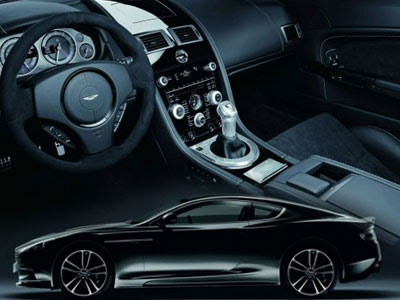 2010 V12 Vantage Carbon Black Aston Martin Sports Car
2010 V12 Vantage Carbon Black Aston Martin Sports CarFor the interior, owners will be greeted to swathes of Obsidian Black leather highlighted with a contrast silver coarse. Lightweight seats formed from Carbon Fibre and Kevlar saving 17 kg over the standard seat also feature together with Piano black facia trim, centre stack and centre console, anodised black tread plates and unique sill plaques build on the carbon theme. The Aston Martin 700w Premium Audio System is delivered as standard in the V12 Vantage while the DBS boasts the Bang & Olufsen Beosound DBS audio system as standard.
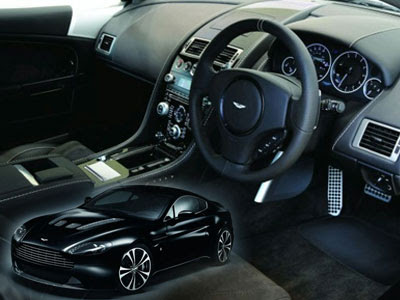 2010 V12 Vantage Carbon Black Aston Martin Sports Car
2010 V12 Vantage Carbon Black Aston Martin Sports CarCustomers who order a Carbon Black Edition V12 Vantage will have the opportunity to experience Aston Martin’s renowned Performance Driving Course (UK and Europe only) free of charge which offers a memorable day helping customers to equip themselves with the skill sets to enhance the enjoyment of their Aston Martin on the track.
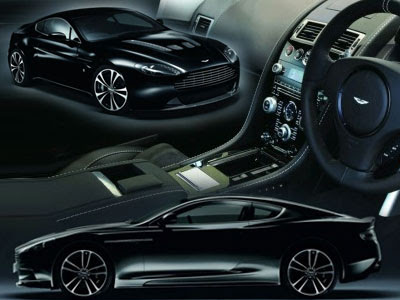 2010 V12 Vantage Carbon Black Aston Martin Sports Car
2010 V12 Vantage Carbon Black Aston Martin Sports CarThe Carbon Black Editions are available to order from the official Aston Martin dealership network with final pricing (expected to be approximately 5% over current base prices) to be confirmed in the New Year.
Labels: 2010, Aston Martin, Sports Car, V12
Thursday, December 24, 2009
2011 BMW 5-Series F10 Sports Concept plans by Lumma Design, TopCar, and Cardi that have joined forces to offer a new Sport package
0 comments Posted by anna maria at 2:26 AMTwo Russian tuning firms and a German company have teamed up to offer a new kit for the 2011 BMW 5-Series F10. TopCar and Cardi, from Russia, and Lumma Design have joined forces to create an aggressive styling package which will likely boost performance.
The brand-new 2011 BMW 5-Series hasn't even made its motor show debut yet, but tuners are already actively working on their plans to present an array of performance and cosmetic goodies for the Bavarian automaker's premium sedan.
German and Russian tuning houses are joining efforts to create bodykit and tuning packages for the F10 5-series. Full set of renderings inside. One of the first proposalscomes from a trio of companies, Russia's TopCar and Cardi, and Germany's Lumma Design, that have joined forces to offer a new sport package for the Bimmer.
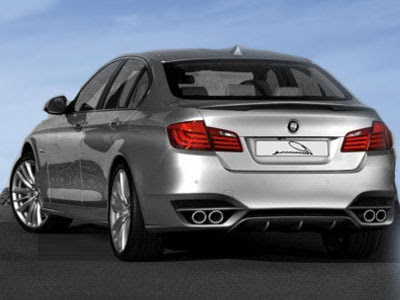 2011 BMW 5-Series F10 Sports Concept plans
2011 BMW 5-Series F10 Sports Concept plansTopCar and Cardi are the russian tuners and Lumma Design is the german tuner. Judging by the included renderings, the car will maintain a bulging nose, with new carbon fiber front lip installed underneath. Their renderings show an aggressive front end package including a new front bumper aggressively sculpted with huge air inlets, carbon fiber front lip, LED lighting and honeycomb grill. TopCar and Cardi will handle the design aspect of the project while Lumma Design will be responsible for the manufacturing of the kit as well as the performance upgrades. One version of the kit also features super wide wheel fenders and aggressive side skirts. The rear features a carbon fiber rear trunk spoiler, together with carbon fiber rear diffuser, quad exhaust pipes. Two types of wheel options will be available.
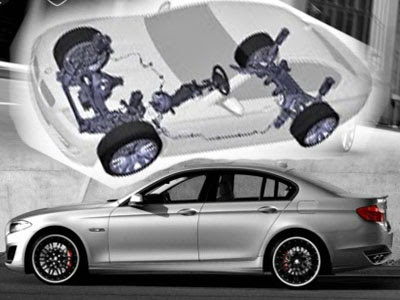 2011 BMW 5-Series F10 Sports Concept plans
2011 BMW 5-Series F10 Sports Concept plansAlthough the three tuners have not disclosed any specific details about the package, they did release a set of photoshoped images that show a new wide bodykit trimmed in carbon fiber that consists of new bumpers, fender extensions, side skirts and a boot lid spoiler.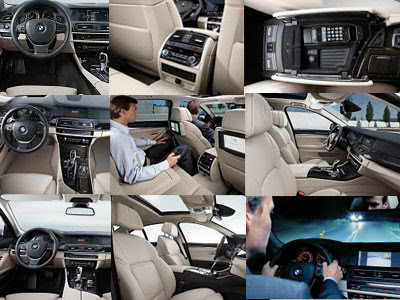 2011 BMW 5-Series F10 Sports Concept plans
2011 BMW 5-Series F10 Sports Concept plans
 2011 BMW 5-Series F10 Sports Concept plans
2011 BMW 5-Series F10 Sports Concept plansIn addition, the tuners previewed three different alloy wheel designs for the 2011 5-Series.
This custom F10 5-series is expected to debut in April 2010, along with details of the full performance tuning package.
This custom F10 5-series is expected to debut in April 2010, along with details of the full performance tuning package.
Labels: 2011, BMW, Concept Car, Design Car, Spors Car, Sport Sedan
Wednesday, December 23, 2009
2010 BMW ActiveE Concept Car Powered By A New Synchronous Electric Motor Specially Developed For This Vehicle
0 comments Posted by anna maria at 12:09 AMIntroducing the BMW ActiveE Concept, the latest electric vehicle project under BMW Group's initiative to produce vehicles that explore solutions to minimize environmental impacts while preserving the kinetic driving experience for which BMW has long been known. The BMW ActiveE Concept follows the all-electric MINI E as the second large-scale electric vehicle test program to be conducted in the hands of interested customers.
The BMW Concept ActiveE is based on the BMW 1 Series Coupe. The BMW Concept ActiveE is powered by a new synchronous electric motor specially developed for this vehicle. Its maximum output is 125 kW/170 bhp, the maximum torque of 250 Nm / 184 lb-ft is available from standing as is typical for electric motors and remains available over an unusually broad load range.
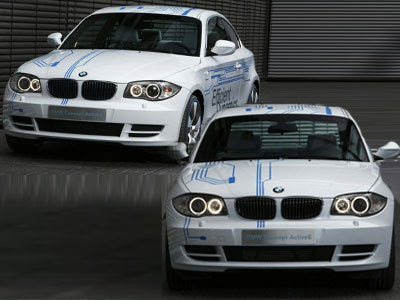 2010 BMW ActiveE Concept Car
2010 BMW ActiveE Concept CarPredicted driving performance figures: acceleration from zero to 60 km/h (37mph) in less than 4.5 seconds and from zero to 100 km/h (62mph) in less than 9 seconds, maximum speed: approx. 145 km/h (90 mph, electronically limited). As with the MINI E, the real-world range is expected to be about 160 km / 100 miles on a single charge, depending on conditions (FTP72 cycle range is calculated to be 240 km / 150 miles in simulation).
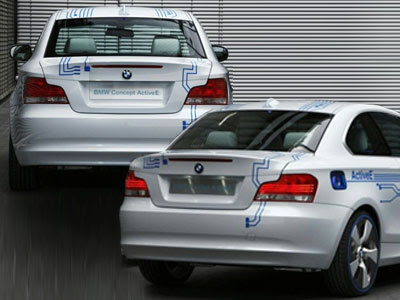 2010 BMW ActiveE Concept Car
2010 BMW ActiveE Concept CarThe electric drive system draws its energy from new, advanced lithium-ion battery pack developed jointly by BMW and the co-operation partner SB LiMotive especially for the BMW ActiveE Concept. They enable a range of approx. 160 kilometres (100 miles) in everyday use. An intelligent battery management system helps achieve this range largely independently of external climatic conditions. Additionally, the charging period required for the lithium-ion batteries is very short. On the European power grid, the battery pack can be fully charged in just 3 hours at a wall box with a current of 50 ampere at 230/240 volts. In North America, using a high-current (32 ampere continuous) residential wall box, the charge time is about 4.5 hours.
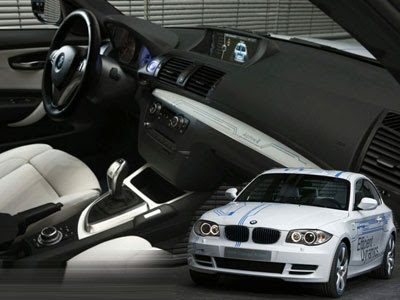 2010 BMW ActiveE Concept Car
2010 BMW ActiveE Concept CarThere is a clearly recognizable differentiation from the serial production model of the BMW 1 Series Coupe with the body finish in Liquid White metallic, as well as graphic elements derived from printed circuits in Electric Blue on the hood, doors, roof and trunk lid, as well as the lettering “ActiveE”, “eDrive” and “EfficientDynamics” on the doors and side panels. Specific light-alloy wheel wheels, the lack of an exhaust system and blue illuminated elements such as the roof fin and charging connection highlight the special character of this electrically powered concept vehicle.
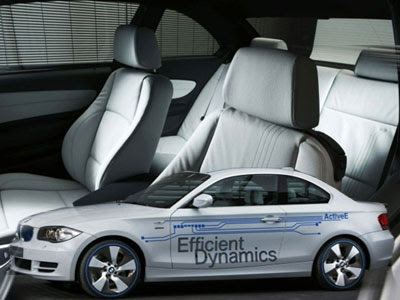 2010 BMW ActiveE Concept Car
2010 BMW ActiveE Concept CarIn the BMW ActiveE Concept, new BMW ConnectedDrive services are presented which have been designed exclusively for use in an electric vehicle. This includes specific remote functions which enable the use of a mobile phone to check the charge status of the battery, search for public charging stations and activate the vehicle’s auxiliary heating and air conditioning functions. The BMW ActiveE Concept creates a basis for the expansion and intensification of this field testing on electro-mobility, oriented towards enabling large-scale production in the future. The aim is to produce a fleet to a scale which will exceed that of the MINI E. The BMW ActiveE Concept moves a little closer towards the future of an individual mobility which will combine driving pleasure with CO2-free travel.
Labels: BMW, Concept Car, Electric Car
Subscribe to:
Comments (Atom)


